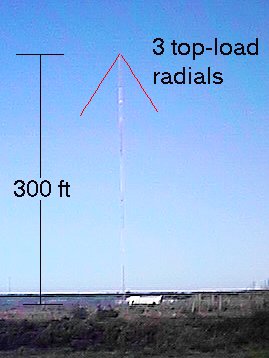

I was surprised to see only three top radials, with isolators that clearly could be seen. Each the top-load radial is approximately 50 ft long and inclined downwards at an angle of 45 degrees.
The isolated mast of the antenna is 300 ft high (see photo) and is on
the North-Eastern part of the Galveston island, very close to the sea.
That might explain the excellent radiation and the reception of the beacon
in the Pacific area.
For more information see this e-mail from Dave, ZL3FJ of March 2000:
Geri
Great to finally see a picture of the GLS antenna. Its top loading
looks to
be designed as outlined in Watt's 'VLF Engineering' where the
drooping
umbrella wires are insulated off at a point such that they do not go
below
about 70% of the vertical mast height.
Rick Warnett in P29 has been able to confirm its height at 300
feet and the
power as 2kw in correspondence- extract below from his very recent
(today!!)
posting to the lofexp reflector.
At 300 feet it 's a biggie by NDB standards but as the distance
down here
is over 12000 km it's still doing very well, possibly the best LF DX
that I
am aware of, excluding high power broadcast stations. There's one of
those
on the Kamchatka(?) Peninsula up top of the Pacific that roars in here
in
winter months after dark on 180 kHz exact.
73
Dave, ZL3FJ
******************* extract from Ricks lofexp posting**********
Fellow Lowfers,
The following was sent back to me in regard to GLS. MAYBE A BIT LATE
NOW AS
OTHER COMMENTS HAVE BEEN MADE, HOWEVER.......
Hi Rick,
Got on the phone with the Galveston FAA field Office yesterday.
GLS uses
a 300' verticle steel tower for the antenna. The entire tower radiates,
just
like the usual am broadcasters. Power is confirmed @ 2000 watts. I
talked
with a fella named Jimmy Grubbs, a Texan with the usual Texas drawl.
Friendly dude. They verify reports at:
FAA Field Office
2115 Terminal Drive
Galveston, Tx. 77554
phone # 1-409-744-1195
I believe you folks would be the first from your area.
